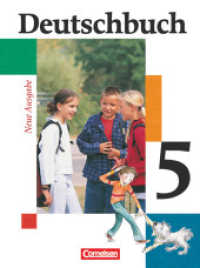Full Description
Internet Vulgarities in China is the first comprehensive study to critically examine the cultures, governance and politics of internet vulgarities in Chinese society. Comprising twelve chapters, the authors present empirically rich case studies to explore the nature, regulation and evolution of the internet cultural products, vernacular internet cultures and subcultural online communities which have been officially deemed 'vulgar' by the state, official media and policy documents.
From 'vulgar' online music, internet literature, memes, web dramas, influencers, video games to online fandoms, this timely book demonstrates that the disciplinary power of China's 'anti-vulgarity' campaigns stems from the state's strategic use of the ambiguous concept of 'vulgarity' to judge and regulate the aesthetic and ethical dimensions of popular digital media cultures. This process of turning language into law—a form of linguistification of rule—functions as a key technique of digital and cultural governance, ensuring that these cultures evolve in accordance with the ideological, moral and cultural values of the party-state.
Internet Vulgarities in China will make a significant contribution to the fields of China's digital media studies, popular culture studies, internet and cultural governance. It is an essential resource for scholars, researchers and students seeking a critical understanding of China's digital media cultures and its governance and politics.
Contents
1. (Introduction): Judgement of ugliness: The politics of 'anti-vulgarity' in China's media and cultural governance Part I: Internet Cultural Products 2. Messy realities and power secrecy: Contested and persistent presences of vulgarities in the governance of Chinese web novels 3. Legitimising musical taste: 'Vulgar internet songs' from 'Mice loves rice' to PG-One 4. Boy's love as 'vulgar' culture? The discourse of anti-boys' love and the cis-heteronormative governance against BL-adapted web dramas in China 5. Vulgar spirits of games and play from state to society: An alternative history of videogames in China Part II: Vernacular Internet Cultures 6. 'Toxic Chicken Soup' as a genre: The dialectics of hope and its governance on We Media 7. Ball-ache, dick hair and serial cunt words: The role of vulgarity in Chinese internet language 8. Negativity as vulgar? The rise of self-mockery culture and its governance 9. In search of the opposite of the canonical: eGao Red Classics and its regulation Part III: Subcultural Online Communities 10. Vulgarising a subaltern taste on Chinese social media: The rise and fall of hanmai rap and social shake dance 11. Eroticised internet celebrity and vulgarity in China: The case of Aoi Sola 12. 'Chasing idols in a rational way': Governing toxic 'fan circle' culture in China








